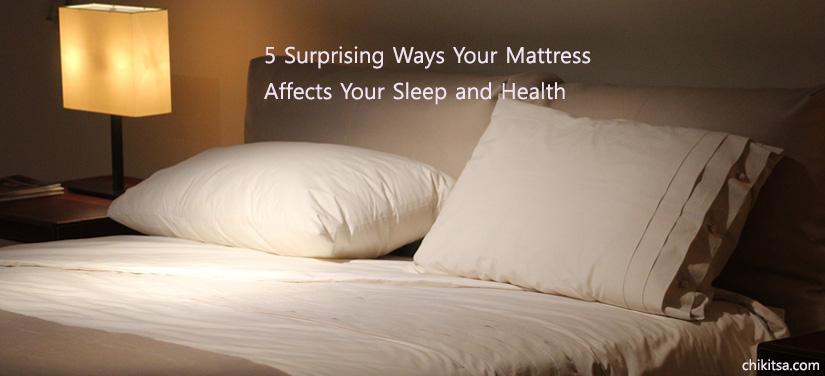5 Surprising Ways Your Mattress Affects Your Sleep and Health

One would think of going out to a party without wearing the appropriate attire. But still, in spite of spending a third of our lives sleeping, most of us don’t seem too bothered about the mattress that we use and it is definitely not because we don’t realize the importance of a comfortable mattress.
In a poll conducted in the year 2011 by the National Sleep Foundation, it was discovered that 92% of people stress and agree with the importance of a comfortable mattress for a sound sleep.
But an improper mattress or a mattress that is just too old could be the reason for that kink in your neck or for the pain in your lower back. Here are 5 sly ways your mattress ends up affecting your sleep and in turn your overall health.
Buying A New Mattress Might Bang Your Stress
A small study was conducted in the year 2009 where a group of 59 healthy men and women were made to sleep 28 consecutive nights on their usual mattresses and then another 28 nights on new, medium firm mattresses. They were then requested to make an evaluation of their stress levels depending on factors like worrying, different thoughts, irritability, headaches, nervousness, trembling etc. It was found that the new beds made a significant decrease in stress, maybe because of the overall increase in the quality of sleep and decrease in pain due to the firmer setup.
You Might be Allergic to Your Mattress
Now for this, let’s put all the blame on the dust mites who have made your mattress their sweet home. The dead skin cells that you shed naturally are what attract them to your mattress, to feed on. More than 20 million Americans are allergic to these buggers, as per WebMD and they more problematic for people who suffer from asthma, According to CNN reports. This was also extensively discussed on the sleepaider mattress forum.
In order to keep these dust mites and bed bugs at bay, one must ensure that bed sheets and pillowcases are washed in hot water at least once a week. And a slipcover labelled allergy proof can keep stop them from travelling to your sheets and pillowcases from the mattress. As per Better Sleep Council, if dust mites are a severe problem, then the mattress should be vacuum cleaned on a regular basis.
Medium-Firm is A Subjective Level
There is nothing that can define and differentiate between a soft and a firm mattress. A person who weighs 250 pounds may describe a particular mattress as soft whereas the same mattress may be hard for a person who only weighs 125 pounds. Usages like “ultra-plush†sound quite captivating, but the only way to know if it’s really opulent is when you spend some time horizontally.
There is hardly any evidence that can substantiate that a firm or a soft mattress is better for your sleep quality. At the end of the day, all of it boils down to an individual's personal comfort. So, it is important that you spend a minimum of half an hour “test-sleeping†a mattress before your final purchase.
Tossing and Turning Could Indicate that It is Time for A New One
If your mattress has worn out, for e.g. there is a hole in your mattress or if there is a spring that is sticking out from the inside of your mattress, then it is high time you dispose the current mattress and go in for a new one that suits your requirements. But then, that is not the only reason why you should rush to your nearby mattress outlet; if you feel you are unable to catch up on good quality sleep or if you sleep better while you are away from home, then it might be the right reason to make an investment for.
Using your Mattress as your Home Office can keep you Awake
Experts have agreed a time and again that the bedroom should be reserved for only sleep and sex – else your brain may keep expecting you to answer your work e-mails while you hit the bed, which makes it all the more difficult to fall asleep. Electronic gadgets don't belong with you on your bed; they emit a kind of blue light that disrupts the brain's natural bedtime mechanism and keep you awake longer.








